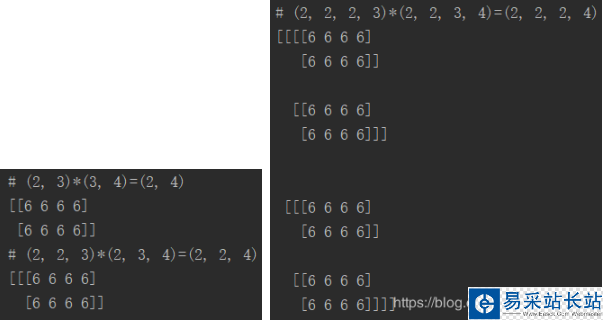Tensorflow二维、三维、四维矩阵运算(矩阵相乘,点乘,行/列累加)
1. 矩阵相乘 
根据矩阵相乘的匹配原则,左乘矩阵的列数要等于右乘矩阵的行数。
在多维(三维、四维)矩阵的相乘中,需要最后两维满足匹配原则。
可以将多维矩阵理解成:(矩阵排列,矩阵),即后两维为矩阵,前面的维度为矩阵的排列。
比如对于(2,2,4)来说,视为2个(2,4)矩阵。
对于(2,2,2,4)来说,视为2*2个(2,4)矩阵。
import tensorflow as tf a_2d = tf.constant([1]*6, shape=[2, 3])b_2d = tf.constant([2]*12, shape=[3, 4])c_2d = tf.matmul(a_2d, b_2d)a_3d = tf.constant([1]*12, shape=[2, 2, 3])b_3d = tf.constant([2]*24, shape=[2, 3, 4])c_3d = tf.matmul(a_3d, b_3d)a_4d = tf.constant([1]*24, shape=[2, 2, 2, 3])b_4d = tf.constant([2]*48, shape=[2, 2, 3, 4])c_4d = tf.matmul(a_4d, b_4d) with tf.Session() as sess: tf.global_variables_initializer().run() print("# {}*{}={} /n{}". format(a_2d.eval().shape, b_2d.eval().shape, c_2d.eval().shape, c_2d.eval())) print("# {}*{}={} /n{}". format(a_3d.eval().shape, b_3d.eval().shape, c_3d.eval().shape, c_3d.eval())) print("# {}*{}={} /n{}". format(a_4d.eval().shape, b_4d.eval().shape, c_4d.eval().shape, c_4d.eval()))
2. 点乘 
点乘指的是shape相同的两个矩阵,对应位置元素相乘,得到一个新的shape相同的矩阵。
a_2d = tf.constant([1]*6, shape=[2, 3])b_2d = tf.constant([2]*6, shape=[2, 3])c_2d = tf.multiply(a_2d, b_2d)a_3d = tf.constant([1]*12, shape=[2, 2, 3])b_3d = tf.constant([2]*12, shape=[2, 2, 3])c_3d = tf.multiply(a_3d, b_3d)a_4d = tf.constant([1]*24, shape=[2, 2, 2, 3])b_4d = tf.constant([2]*24, shape=[2, 2, 2, 3])c_4d = tf.multiply(a_4d, b_4d)with tf.Session() as sess: tf.global_variables_initializer().run() print("# {}*{}={} /n{}". format(a_2d.eval().shape, b_2d.eval().shape, c_2d.eval().shape, c_2d.eval())) print("# {}*{}={} /n{}". format(a_3d.eval().shape, b_3d.eval().shape, c_3d.eval().shape, c_3d.eval())) print("# {}*{}={} /n{}". format(a_4d.eval().shape, b_4d.eval().shape, c_4d.eval().shape, c_4d.eval()))
另外,点乘的其中一方可以是一个常数,也可以是一个和矩阵行向量等长(即列数)的向量。
即 
因为在点乘过程中,会自动将常数或者向量进行扩维。
a_2d = tf.constant([1]*6, shape=[2, 3])k = tf.constant(2)l = tf.constant([2, 3, 4])b_2d_1 = tf.multiply(k, a_2d) # tf.multiply(a_2d, k) is also okb_2d_2 = tf.multiply(l, a_2d) # tf.multiply(a_2d, l) is also oka_3d = tf.constant([1]*12, shape=[2, 2, 3])b_3d_1 = tf.multiply(k, a_3d) # tf.multiply(a_3d, k) is also okb_3d_2 = tf.multiply(l, a_3d) # tf.multiply(a_3d, l) is also oka_4d = tf.constant([1]*24, shape=[2, 2, 2, 3])b_4d_1 = tf.multiply(k, a_4d) # tf.multiply(a_4d, k) is also okb_4d_2 = tf.multiply(l, a_4d) # tf.multiply(a_4d, l) is also ok with tf.Session() as sess: tf.global_variables_initializer().run() print("# {}*{}={} /n{}". format(k.eval().shape, a_2d.eval().shape, b_2d_1.eval().shape, b_2d_1.eval())) print("# {}*{}={} /n{}". format(l.eval().shape, a_2d.eval().shape, b_2d_2.eval().shape, b_2d_2.eval())) print("# {}*{}={} /n{}". format(k.eval().shape, a_3d.eval().shape, b_3d_1.eval().shape, b_3d_1.eval())) print("# {}*{}={} /n{}". format(l.eval().shape, a_3d.eval().shape, b_3d_2.eval().shape, b_3d_2.eval())) print("# {}*{}={} /n{}". format(k.eval().shape, a_4d.eval().shape, b_4d_1.eval().shape, b_4d_1.eval())) print("# {}*{}={} /n{}". format(l.eval().shape, a_4d.eval().shape, b_4d_2.eval().shape, b_4d_2.eval()))
新闻热点
疑难解答